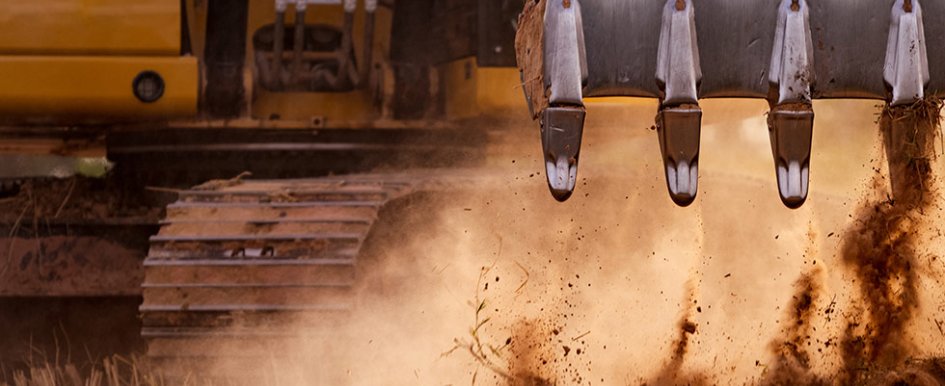
For more than 30 years, the team at Atlas Excavating focused on laying pipes. The family-owned company built a solid business, but in doing so, it didn’t necessarily grow its offerings or bring in new technology.
A few years ago, the Atlas team recognized the growing opportunities in grading, excavation and site preparation.
However, leadership understood it needed new technology as they charted a forward-thinking course for their West Lafayette, Indiana-based company. GPS-enabled technology opened new avenues for Atlas by allowing them to branch out, explore new business opportunities and innovate their company. The company initially focused on public sewer work and subdivisions. New technology helped Atlas chart a new direction and transform the company from focusing primarily on laying pipe to seeking out new types of projects while adding work to their portfolio, doubling their team size, triggering a growth boom and allowing them to take on much larger projects. Today, Atlas performs all aspects of site-civil construction and earthwork for industrial, institutional, commercial, and residential sites.
“Technology has transformed our company,” said Atlas Chief Operating Officer (COO) Nick Dillon. “We were historically a pipe company. We would have 10 pipe crews and one dirt crew. Now, we have seven dirt crews.”
A New Realization
One of the Atlas team’s initial concerns was the ability to use and implement new technology.
At first, they didn’t fully realize how much GPS could improve their operations. However, after seeing the technology in action — including its accuracy and how easy it was to learn and operate — the team quickly realized the old way was not the path forward.
They researched options and ultimately turned to Leica-powered equipment. By adopting advanced technology, Atlas could recruit younger workers who are more tech savvy.
Even though these new additions didn’t have the same experience as veteran operators at Atlas, the new solutions empowered younger workers to work beyond their experience levels. The result? Atlas drastically reduced training time and allowed workers to hit the jobsite quicker.
After they started using the new equipment, the Atlas team quickly realized their former process wasn’t the best way to perform the work. Adding GPS to excavators has minimized how long they need equipment on the jobsite.
The payoff was immediate: Atlas avoided outlaying capital to buy additional equipment. That’s because the team could use technology to optimize equipment usage and ensure equipment remained in use and didn’t sit idle on the jobsite for extended periods.
Technology Changed the Stakes
The Atlas team initially pursued excavation work to lay pipe on a project. If they handled the excavation work, they relied on traditional — and more manual — processes.
One of the most significant pain points was setting stakes over and over again. Jobsites often had so many stakes that they were impossible to navigate.
When the Atlas team saw how much faster subcontractors using GPS-enabled technology could handle the same excavation work, they explored their options.
Thanks to a partnership with Westside Tractor, the Atlas team demoed an excavator and immediately saw its benefit. Until they tried out the excavator system, they had to keep a dozer with a system on it tied to the excavator, constantly working the dirt around.
When they put a system on the excavator, the dozer was freed up to operate in locations on the project. At the end of the day, the team straightened up what the excavator had graded. The job increased efficiency by freeing up the dozer to grade another part of the project, as the excavator could accurately cut to grade all day long. After seeing the technology in action, they immediately bought two excavator systems.
As the Atlas team rolled out the new equipment, they checked the work to confirm its accuracy. As Atlas grew more accustomed to the new equipment, the team began to trust and rely on the accuracy of the technology, reducing duplicate staking and field measuring.
“That philosophy is starting to change because when we did dirt jobs, we used to do everything twice,” Dillon said. “We’re not making the mistakes; we’re doing it once and leaving.”
Before investing in Leica equipment, two or three workers would walk with a string and establish the level, and a grader would follow them. Now, one team member does it alone, and the string lines and tape measures are left in the toolbox.
“It is right; we can prove that it’s right: There is no interpretation from one person to the next,” Dillon said. “It’s taken the human error out of it.”
Real Benefits
Ultimately, the shift propelled the company into a constant year-over-year growth trajectory. Because of the increased efficiency, Atlas could sometimes cut its grading estimates by more than 50%. That made the company extremely competitive, driving even more customers their way.
“Ultimately, that’s what it’s done: made us cheaper, faster, more efficient,” Dillon said.
Because of its success, Atlas has slowly added equipment, allowing the company to move into larger markets and projects. As a result, they’ve experienced a growth boom in recent years, moving from small to multimillion-dollar commercial projects.
“We’re doing fewer small commercial sites and subdivisions,” Dillon said. “It’s allowed us to expand to bigger markets.”
As happens in many companies, some tenured Atlas team members initially resisted technology. Their concerns ranged from learning how to use the new technology to what its deployment meant for their jobs.
While the Atlas team quickly learned that technology makes the construction industry more appealing to younger workers, tenured team members also embraced these new tools, realizing it helped them accomplish more.
Training teams to use new equipment was quick and easy, and veteran workers and newcomers took to using the technology to perform their tasks.
Now, the only thing left to do for the Atlas team is to keep the dirt moving.
